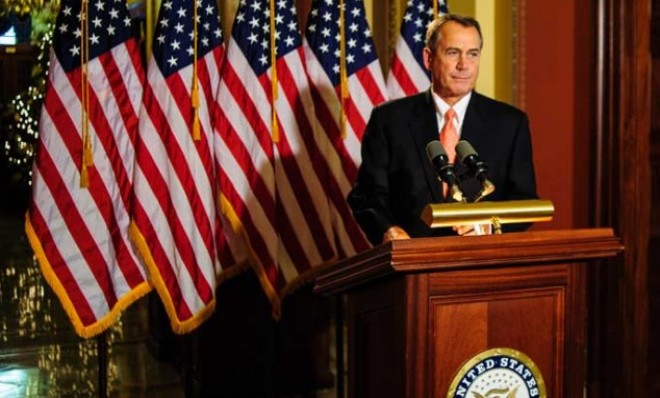Will the fiscal cliff vote cost John Boehner his speakership?
The House speaker allowed an up-or-down vote on a Senate deal to avert a looming fiscal calamity... and raise taxes. Is that enough to spark a coup?


A free daily email with the biggest news stories of the day – and the best features from TheWeek.com
You are now subscribed
Your newsletter sign-up was successful
Plenty of conservatives are hopping mad about the "fiscal cliff" fix approved late Tuesday by the House — and that includes many House Republicans. A prime target for their anger is their own House speaker, John Boehner (Ohio), who not only voted in favor of the $4 trillion package to extend a wide range of tax breaks, increase taxes on the rich, grow spending, and do a bit of budget trimming, but also pushed for it to come up for a floor vote without any deal-breaking spending-cut amendments. In the end, only 84 Republicans joined Boehner and 172 Democrats to send the bill to President Obama for his signature. Among the 151 Republican "nay" votes were Majority Leader Eric Cantor (R-Va.) and the No. 3 House Republican, Majority Whip Kevin McCarthy (R-Calif.). Cantor, who is widely believed to be nursing ambitions to replace Boehner, led the GOP opposition to the package.
Boehner prepared his caucus with two closed-door meetings on Tuesday afternoon, the first "a Festivus-like airing of grievances," says David Weigel at Slate, and the second an actual strategy session on what to do about the bill. Cantor and his fellow opponents pushed to amend the bill with spending cuts, which would have effectively sunk it, but "even the fighting option — amending the Senate bill — could not garner the requisite support among Republicans to pass," says Daniel Newhauser at Roll Call. So Boehner broke the unofficial "Hastert Rule," under which Republican leaders don't bring a measure to the floor without a "majority of the majority," and brought the un-amended Senate plan to a vote. "It cannot be said that the conference did not go out swinging," says Newhauser. "The blows, however, landed more often on their own leader than on the opposing party."
The question now is whether Boehner can hang onto his speaker's gavel after losing so much of his caucus in this vote, says Heather "Digby" Parton at Hullabaloo. The vote for the next House speaker will take place on Thursday, and "Cantor's acting very aggressive, so I think there's some legitimate fear that he might make his move." Cantor openly defied Boehner at the caucus meetings, which "has to be seen as a clear indication that his power is spent," says Martin Longman at Booman Tribune. Tuesday's machinations look to be more a "palace coup" than "a freak-out over the terms of the deal." And that's not so surprising, really. "It's just hard to see how or why the GOP caucus would re-elect Boehner as their speaker if they so obviously do not trust him or want to follow his lead."
The Week
Escape your echo chamber. Get the facts behind the news, plus analysis from multiple perspectives.

Sign up for The Week's Free Newsletters
From our morning news briefing to a weekly Good News Newsletter, get the best of The Week delivered directly to your inbox.
From our morning news briefing to a weekly Good News Newsletter, get the best of The Week delivered directly to your inbox.
Still, "there are some positive signs for Boehner," says Bob Cusack at The Hill. He commands the loyalty of about 100 House Republicans, and "Boehner has fostered some pockets of unity in various parts of his unruly conference." Also, as Political Wire's Taegan Goddard reports:
Ron Meyer, the spokesman for conservative group American Majority Action, tells Breitbart News' Matthew Boyle that "enough House Republicans have banded together in an effort to unseat" Boehner — at least 20 — "but the one problem these guys face is they need a leader to coalesce behind."
It's undeniable that Boehner is "on thin ice for Thursday's speaker vote," says Allahpundit at Hot Air. In a way, it was brave of him to "double down by lending his own vote to the compromise," especially with Cantor opposed. My guess is that "either he's supremely confident that there aren't" enough Republicans "willing to block his election as speaker on Thursday or he's reached the point where he doesn't care if they do."
Hard to believe we might have the same leadership in the next Congress as we did for this process, but then not long ago it was also hard to believe we'd have the same leadership in the White House and the Senate in 2013 as we had in 2012. And yet here we are.... Ultimately, I think [Obama] is the only player here who had appropriate contempt for the process. He knew nothing important would be achieved so he focused on tax hikes to try to diminish the opposition by driving a wedge in their caucus. In the end, he gave a little on the income threshold in exchange for fracturing House Republicans. Not a bad trade short-term.
A free daily email with the biggest news stories of the day – and the best features from TheWeek.com
Peter has worked as a news and culture writer and editor at The Week since the site's launch in 2008. He covers politics, world affairs, religion and cultural currents. His journalism career began as a copy editor at a financial newswire and has included editorial positions at The New York Times Magazine, Facts on File, and Oregon State University.
